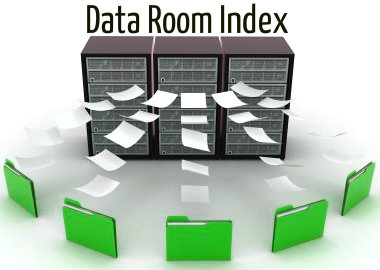
What should a Data Room Index look like?
When considering selling your business, you may hear mention of a Data Room. Since this is something specific to the due diligence process of a business sale or a project bid, your first question may well be “what is a data room”? And following after, you’ll then wonder what a data room index is…
What is a Data Room?
Data is the key to confidence on the part of a potential buyer, being an important factor in the agreed price – and indeed, whether or not a sale goes ahead at all. A data room is often used to help with this aspect of the process.
As a business vendor, you will want to make sure that your potential buyers have access to as much data about your business as they need, in order to make their decision, and to value your business fairly. At the same time, you may well have understandable concerns about the confidentiality of the data. After all, you certainly wouldn’t want commercially sensitive data to be sent around insecurely, with the risk of its being passed on to unauthorised parties.
This is where a data room comes in. The practice of using a data room dates back many years, and has traditionally been a specific room where all of the relevant data is kept for inspection by the bidders. The room is carefully monitored, with the purpose of ensuring that the data is only inspected there, and that it doesn’t leave the room insecurely.
As time has moved on and technology has advanced, the concept of a data room has become increasingly computer-based. If a physical data room is used, it’s likely to contain secure computers owned and controlled by the vendor (or their data room service provider). These computers can be used to view relevant data on-screen, but won’t be linked to the internet and won’t permit copies of files to be made or e-mailed.
In the past few years, though, virtual data rooms have become more popular, as they do away with a lot of the costs and logistical requirements of physical data rooms. A virtual data room is essentially a secure website, carefully controlled with authorised log-ins and data encryption, that allows access to all of the files that would traditionally have been available in the physical data room.
There are several benefits of using a virtual data room, including that authorised users can access it from anywhere with an internet connection, so there’s no longer any need for a dedicated room or physical security. It eliminates the need for bidders and advisors to travel to a particular location, so it reduces costs and allows inspection to be done at a time convenient to the due diligence team. This is especially useful when considering international acquisitions.
Unless your business already operates in the area of secure technology, you will almost certainly want to have a virtual data room set up for you by a specialist provider. They will ensure that only authorised users have access to the data, and that digital rights management restrictions are applied to documents so that they cannot be copied, forwarded or printed without specific permission.
When selecting a provider, ask for assurances that they have dealt with clients in your sector before, and check that they fulfil relevant audit and compliance requirements such as the International Safe Harbor Privacy regulations agreed between the United States and the European Union. You will certainly want them to offer security features such as digital watermarking, 256-bit encryption, two-factor authentication login, and customisable security clearance levels for users.
And what about this Data Room Index (or file structure)?
Your virtual data room provider should be able to advise you on a suitable data room index or file structure for the users to access, but when setting up the files, it’s helpful to consider the whole thing from the bidders’ point of view. You’ll want to ensure that everything they are likely to need is provided in the data room, so if in doubt, ask your own lawyer to get hold of (or create) the kind of checklist that a bidder is likely to use when undertaking due diligence. (You can also purchase our Data Room Pack at our store or visit our freebie’s to see our ‘Data Room Structure Sample’). The exact information to be provided will vary a little from sector to sector, but as an example, you’ll want to include the following in your data room index:
Legal – Certificates of incorporation, memorandum & articles of association, share registers, shareholder transaction listings, minutes of board and shareholder meetings, records of any lawsuits or legal proceedings, etc.
Financial – Statutory accounts, management accounts, asset registers, leases, land and building title deeds, finance policies, authorisation levels, etc.
Regulatory – Licences, certifications, registrations, official inspection records, etc.
Human Resources – Organisation charts, employment policies, salary structures, payroll records, employment contracts, staff turnover reports, etc.
Make sure that the files and folders are set out in a logical, intuitive way, and be sure to include contact details so that bidders can get in touch with your key people to confirm key information.
You will find that you can make life easier for yourself if you prepare for this process in advance. To a large extent, these documents are not unique to the sale process, but constitute the data that any business needs to be well-run, so you can prepare yourself for the data room by keeping good records of all of the above areas of operation. Then, when it comes to the data room process, you and your advisors can work with data room provider to ensure that your bidders have all the data they need – and maximise their chances of making bids that reflect the value of your business.
If you’re considering selling your business, you need all the help you can get, so check out the Sell Your Business Store to get an idea on how we can help you out.
Joanna Miller helps business owners navigate their way through the start to finish process of selling a business. Her specialty is helping owners understand how to prepare and make the most of their business sale process to maximise their company’s value. To understand how you can sell your business quickly for the highest sales price, purchase her book, “How To Sell A Business: The #1 guide to maximising your company value and achieving a quick business sale”
